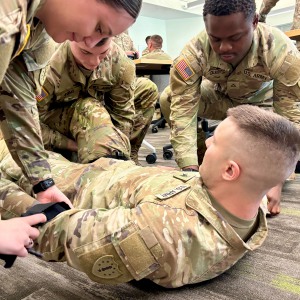The 15 New Hampshire National Guard soldiers who arrived in Texas on Thursday to help monitor the border were warned of safety risks. Many of them were not what you would expect: snakes, ticks, dirty flies, mosquitoes that carry the dengue virus, and deadly scorpions, among the most venomous scorpions in the world.
“We have the most advanced weapons in the world,” Sgt. Matthew Plantier told soldiers in pre-flight training. “One of the biggest things that drives soldiers into combat is illness.”
New Hampshire National Guard troops have been deployed to the southern border twice since 2020, each time for about a year and by the federal government. This time, Gov. Chris Sununu is sending them, at the state's expense, to do what he and many other Republican governors have said the federal government doesn't do: stop the smuggling of drugs, weapons and people into the country.
For the next two months, the 15 soldiers will be stationed at a Texas National Guard base camp in Del Rio, about an hour from Eagle Pass, which became the epicenter of the border crisis in late December when law enforcement faced a record 4,095 illegal immigrants. in one day.
In asking the Joint Legislative Finance Committee last February to fund the $850,000 mission, Sununu said the influx of drugs and individuals on the federal terrorism watch list poses a direct threat to New Hampshire residents.
The Democrats' reaction was immediate.
Some criticized Sununu's request, calling it a political ploy. A few Finance Committee members wondered what 15 New Hampshire soldiers could accomplish along such a vast frontier. Others said Sununu could address the drug crisis more effectively by investing $850,000 in treatment programs.
Sununu told the committee that his trip to the Texas border 10 days ago convinced him to answer Texas Gov. Greg Abbott's call for help.
The article continues after…
“If we sit down and say, ‘Texas, thanks. I did well. “Keep spending your money on behalf of the other 49 states, that's not the answer,” Sununu said. “It is a national crisis, and it is a big problem. … The state will do what we do best. We will stand up and protect our citizens.”
The committee approved Sununu's spending request, by a 6-4 vote, along party lines.
Lt. Col. Greg Helshorn, the Guard's public information officer, described the deployment as an “eyes and ears” mission, meaning Soldiers will support the mission of Operation Lone Star in Texas by searching for, reporting, and detecting illegal immigrant activities and suspected criminal activity. Destroying obstacles placed along the border.
Heilshorn said they will conduct roving patrols of the border and search areas where people have been detained by law enforcement. He said New Hampshire troopers will not be deputized and will not detain, arrest or process people crossing the border.
Troops know some people believe their deployment is for political purposes, as a wedge in the fight between Republicans and Democrats over border policies.
“We hear it on the news. We're all aware of the political climate but we do our best to stay out of it and just focus on the mission,” Helshorn said. The military is supposed to be apolitical, and we try. Governor Sununu is our commander in chief, and we are a military unit We follow orders and carry out our mission to the best of our abilities.
The Ranger asked for volunteers for this deployment, and within two days, 18 people had signed up at the 15 sites, Helshorn said.
The 12 men and three women selected belong to the Guard's military police units, although not all of them work as first responders in civilian life. Private company. Kylie Gilman is an LNA at a long-term care facility in New Boston for people with brain injuries. Private company. Conner Seals works at the Seabrook Nuclear Power Plant.
Seven of the soldiers were previously stationed on the border. None of the fifteen speak Spanish. Before traveling last week, they had a week of refresher training on first aid and firearms, and instruction on protecting themselves from “environmental threats” posed by insects, snakes and scorpions.
Plantier told them to expect snakes if they saw mice. Resist the urge to keep dirty, sick stray dogs. Snacks under their beds will attract mice. Keep up with hygiene.
“I know they say in the field, ‘You have to be tough,’” Plantier said. “Make sure you get those baths daily or every other day.”
Gilman, 21, joined the National Guard when she turned 18. Many of her relatives have served in the military, but she is the first female. She sees a connection between her work as a soldier in the Libyan National Army and her work as a female soldier.
“I just love helping people, basically,” Gilman said.
This will be a second deployment to the Texas border for Sells, who joined the Army about three years ago, right out of high school. He had been home for about four months when he volunteered to return.
“Everyone wants a sense of purpose,” Sills said during a break from training late last month. “For me, especially with this mission, it's about helping people who are just getting here.”
Asked what stuck with him since his first deployment to the border, Sills said it was the culture shock of looking across the Rio Grande into Mexico and seeing migrants living in such difficult conditions.
“All the things we've heard about are health issues and (knowing) that it's a requirement for how they live. It's very hard to see that, and we've seen a lot of it,” Sills said.
“I think the hardest part about this job was just seeing the situation some of these people were in and knowing that there wasn't much we could do as individuals.”

